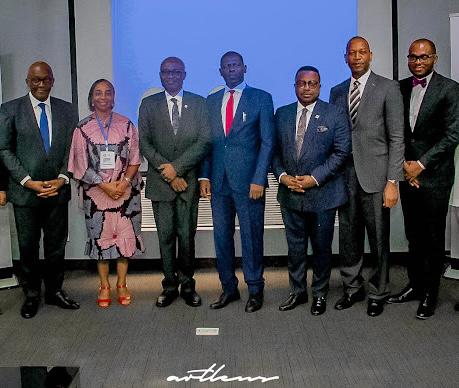
by Legalnaija | Apr 6, 2024 | Uncategorized
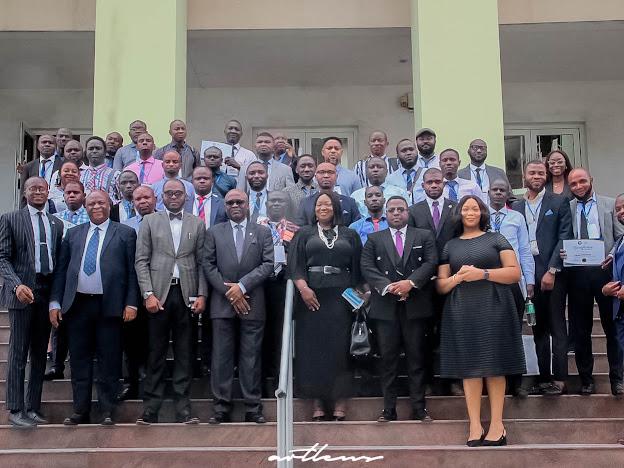
Unlearn Old Skill: JAALS Foundation charges Bailiffs of the Federal High Court
In an effort to elevate the proficiency and professionalism of Bailiffs at the Federal High Court, Lagos Division, the JAALS Foundation, in partnership with SHAN Consulting, orchestrated a comprehensive two-day training program on April 2 and 3, 2024.
Under the endorsement of Hon. Justice John Tsoho, Chief Judge of the Federal High Court, the event drew the participation of esteemed legal luminaries, including Hon. Justice Faji, Administrative Judge of the Federal High Court, Lagos Division, and Mr. Bisi Makanjuola, Chairman of the Nigerian Bar Association, among others.

Mr. Tolu Aderemi, Director of the JAALS Foundation and Partner at Perchstone & Graeys, LP, initiated the training by emphasizing the crucial role of Bailiffs as agents of justice. Aderemi urged Bailiffs to update their knowledge of relevant laws, think innovatively, and proactively execute their duties. The workshop’s primary goal was to equip Bailiffs with new and innovative service delivery methods in alignment with the Nigerian Sheriff and Civil Processes Act, ultimately enhancing prompt justice administration.
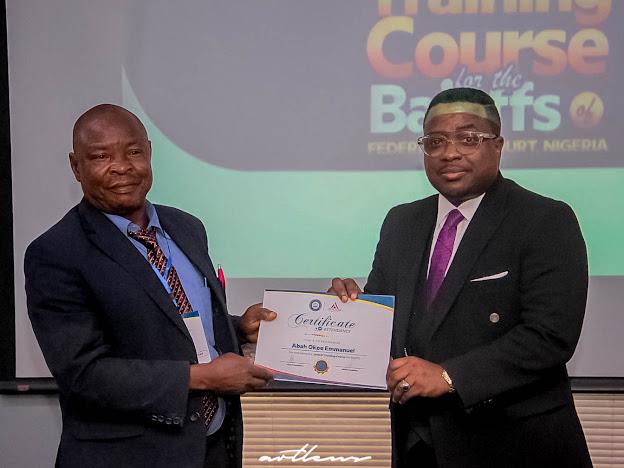
Dr. Babatunde Ajibade, SAN, delivered the keynote address, underscoring the importance of Bailiffs in expediting justice delivery. He advocated for the integration of technology and emphasized the need for law reform to fully implement expected changes. Dr. Ajibade commended the JAALS Foundation for their initiative and encouraged ongoing collaboration to enhance the justice system.
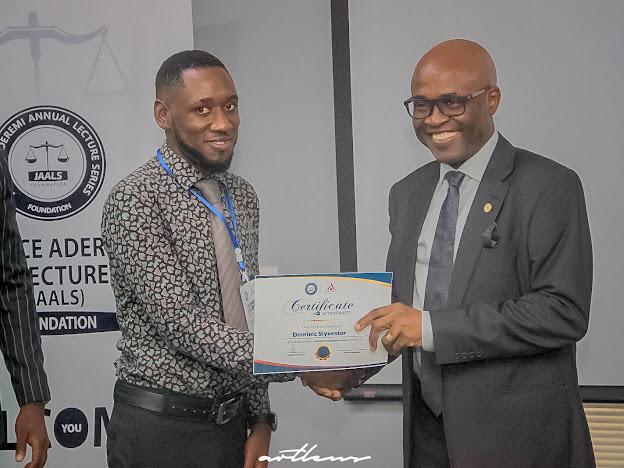
On the second day, Mr. Bidemi Amusa, Managing Director/CEO of Carrilon Properties, stressed the significance of acknowledging excellence among Bailiffs and proposed enhanced welfare packages and recognition for outstanding performance. The NBA’s Lagos branch Chairman, Bisi Makanjuola, reassured Bailiffs of continuous support and announced collaborative efforts to address maltreatment issues.
Ms. Busola Ajala, Director of Strictly Law Business, urged Bailiffs to approach their duties impartially and with dedication, providing practical problem-solving strategies. Interactive sessions led by legal experts focused on service procedures and record-keeping best practices, with Hon. Justice Kalah offering insights on acceptable proof of service and discretion usage.
Goodwill messages from legal luminaries emphasized the importance of excellence in advocating for justice reform. Hon. Justice Ayokunle Faji, representing the Chief Judge, assured that proposed reforms and recommendations would be considered for implementation, emphasizing the need for potential legal amendments.
The training, led by Chief Consultant Mrs. Sylvia Nzekwu, incorporated unique styles and techniques to enhance participant engagement.
A significant highlight was the commitment from the JAALS Foundation and Carrilon Properties Limited to refurbish the Bailiff Section of the Federal High Court, enhancing working conditions as requested by the Head Bailiff.
Hon. Justice Ayokunle Faji expressed gratitude to the JAALS Foundation and partners for their commendable initiative, assuring participants of the Chief Judge’s support for proposed reforms. The event concluded on April 3, 2024, with certificates awarded to all attendees, signifying a crucial step towards empowering Bailiffs and improving justice administration at the Federal High Court.
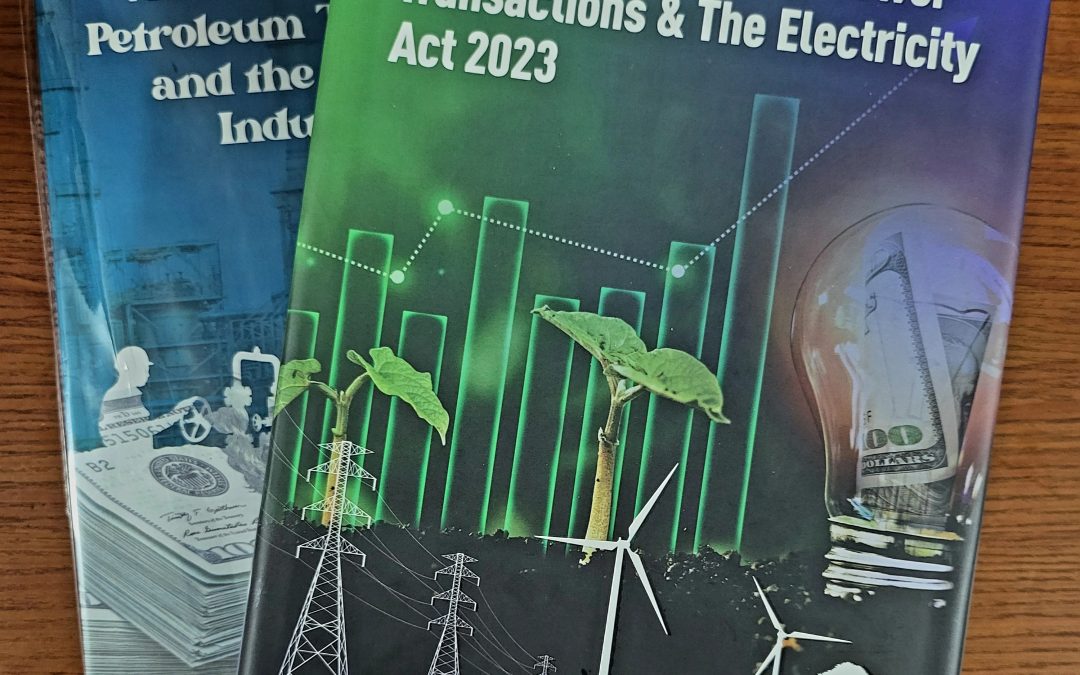
by Legalnaija | Apr 6, 2024 | Uncategorized
We are excited to announce the addition of 2 amazing books on Electricity and Oil and Gas Law to our Lawyers online bookstore. Both books are authored by industry expert, Dr. Ayodele Oni.
See descriptions below;

The Natural Gas Market, Petroleum Transactions, and the Petroleum Industry
Feature/Key points
- Practical issues in the natural gas market.
- The why, what and how to, of acquisitions and due diligence. exercises and reports.
- Solving the challenges across the petroleum values chain in Nigeria.
- The fuel subsidy substitution programme.
- Upstream, Midstream and downstream Transactions & Issues.
- Thorough Analysis of the PIA, Fiscals and Flaws .
- PIA Transportation Network Code and GGTAS.
Available here: https://legalnaija.com/product/natural-gas-market-petroleum-transactions-and-the-petroleum-industry/
Renewables, Electric Power Transaction, & The Electricity Act 2023

Feature/Key points
Solving problems in the power sector using the ‘Olu Omo’ Concept.
Power Sector Transactions, Negotiation strategy and contracting.
Investment opportunities renewables and energy transition
Thorough Analysis of the Electricity Act.
The whether and how of state electricity markets
Consumer protection & electricity theft
Available here: https://legalnaija.com/product/renewables-electric-power-transaction-and-the-electricity-act-2023/
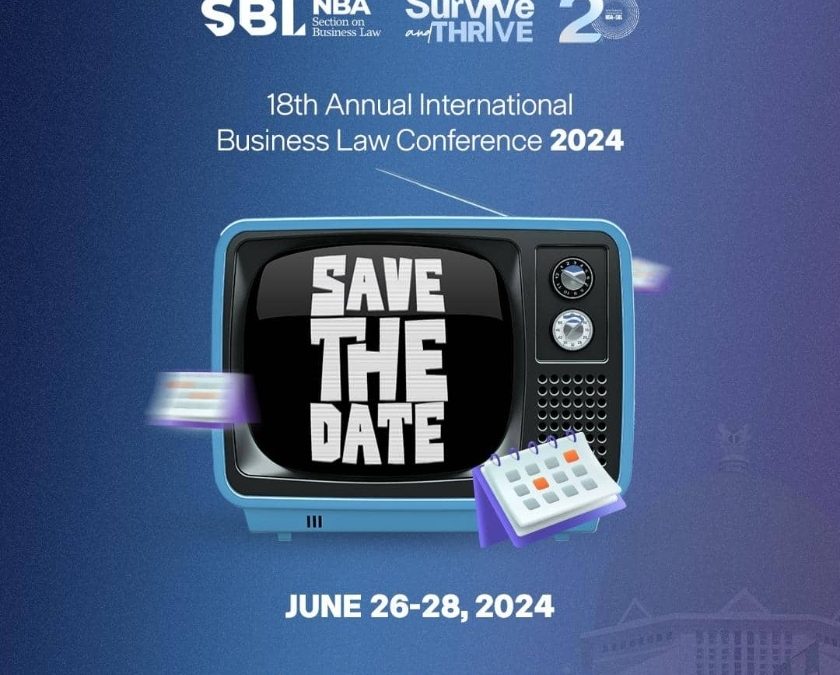
by Legalnaija | Mar 28, 2024 | Uncategorized
The Nigerian Bar Association Section on Business Law (NBA-SBL) has announced the dates for this year’s edition of its annual international business law conference. Themed “Survive and Thrive”, the 2024 edition of the International Business Law Conference will hold from Wednesday June 26, to Friday, June 28 at the Abuja Continental, Federal Capital Territory, Abuja.
This year’s edition, which marks the 18th in the annals of the Annual International Business Law Conference, aims to stimulate discussions on innovative strategies for navigating the challenges posed by a dynamic business environment. Attendees will also glean insights from experts in law and business on how to scale the obstacles of an ever-evolving business and legal landscape.
According to Ose Okpeku, Chair of the 2024 Annual International Business Law Conference, “The theme for this year’s edition – Survive and THRIVE – was carefully chosen because of the multi-faceted challenges confronting the Nigerian economy which span beyond the business and legal landscapes.
The NBA-SBL has also unveiled the executive committee and sub-committees that will steer the affairs of this year’s International Business Law Conference. The executive committee is chaired by Ose Okpeku with Isaiah Bozimo (SAN) and Frances Eneh serving as Vice Chair and Secretary respectively. Chinemerem Ezenwa will serve as Assistant Secretary.
The Fundraising Sub Committee will be led by Dr. Fatima Kere Ahmed who will serve as the Chair, Oludare Senbore who is the Co-Chair and Aderonke Alex-Adedipe who is the Vice Chair. The Program and Content Sub Committee is co- chaired by Solape Peters and Yeside Asolo, with Omoruyi Edoigiawerie as Co-chair and Ugonna Ogbuagu as Secretary.
Moses Faya and Seun Timi will serve as Chair and Vice Chair of the Technology Sub Committee respectively, while Temi Olowu will co-chair the Sponsorship Benefits Sub Committee.
While Dayo Adu has been saddled with the responsibility of chairing the Media and Publicity Sub Committee, he will be assisted by Oyinye Ukeagbu as Vice Chair and Rosemond Phil Othihiwa as Secretary.
The Logistics and Entertainment Sub Committee will be headed by Johnson Amaechi as Chair, while Rita Nwokocha will serve as Secretary with Temitope Arowosegbe as a member. The Regulatory clinic will be coordinated by Marx Ikongbe, Mana B. Phar and Adeola Fayose.
Speaking on the introduction of the conference sub- committees, Ose Okpeku said: “We are pleased to unveil capable and exceptional individuals in the various sub-committees and we are confident that they will deliver on what promises to be an exceptional conference as we celebrate our 20th year anniversary.
Registration for the conference is ongoing. The link to the registration portal is www.nbasbl.org. For more information, please visit the NBA-SBL website at www.nbasbl.org or contact the Conference Secretariat at info@nbasbl.org
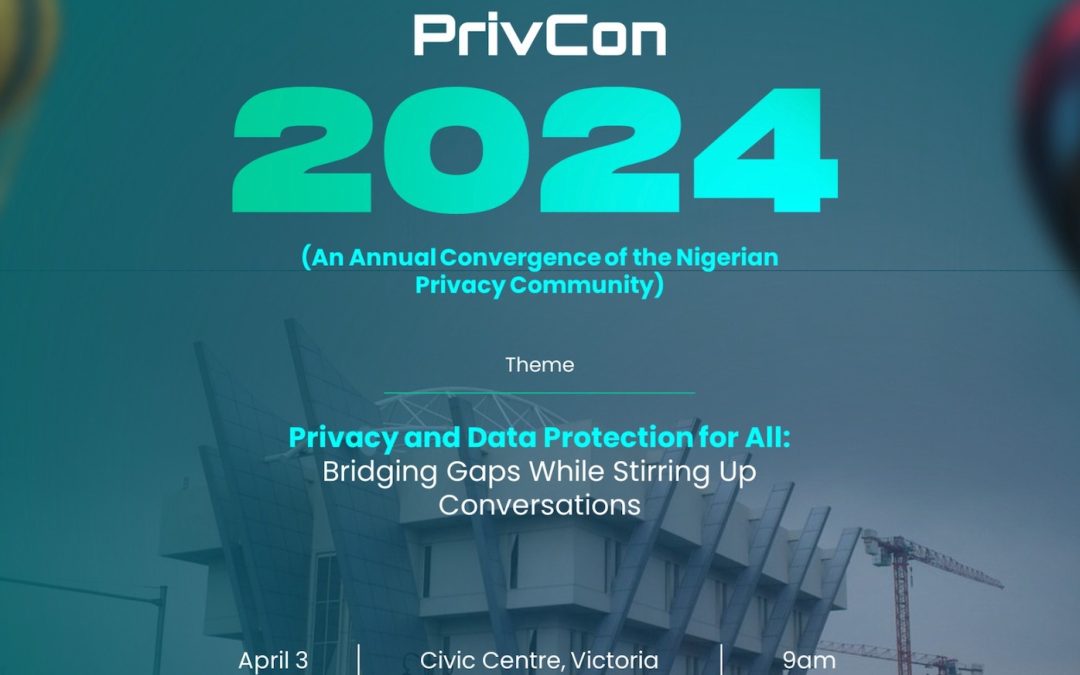
by Legalnaija | Mar 26, 2024 | Uncategorized
The Organizing Committee is thrilled to announce the final list of nominees for the prestigious PrivCon Privacy Awards. These awards aim to honor and celebrate outstanding achievements in the field of privacy and data protection within Nigeria. The winners will be revealed during the much-anticipated PrivCon Privacy Awards on the 3rd day of April 2024 at The Civic Centre, Victoria Island, Lagos, Nigeria.
The PrivCon Privacy Awards serve as a testament to the innovative efforts and significant contributions made by individuals and organizations towards safeguarding privacy rights and fostering a culture of data protection in Nigeria.
After a rigorous selection process, the following final nominees have been shortlisted across various categories:
Privacy Icon of the Year
* Mr Babatunde Irukera
(Former CEO, Federal Competition and Consumer Protection Commission)
Privacy Leading Light (Legal)
* Thelma O. Okorie (Banwo & Ighodalo)
* Ifeanyi Okonkwo (Jackson, Etti & Edu)
* Adaobi Olaye (DataPro Consulting)
* Ridwan Oloyede (Tech Hive Advisory)
* Solomon Okedara (Digital Rights Lawyers Initiative)
* Austin Mbadugha (Ernst & Young)
* Moses Faya (Tech Policy Advisory)
* Tomisin Titilope Olumuyiwa (LG Electronics)
Privacy Leading Light (Tech)
* Emmanuel Umoru (Accuvice Consulting)
* Shalom Tolu Bamigboye (Taxaide)
* Toulu Akerele (Paystack)
* Jennifer Enemuo
Privacy Leading Light (Academics)
* Dr Akinola Akintayo (University of Lagos)
* Prof. Simisola Akintola (University of Ibadan)
Privacy Leading Light (Research)
* Dorcas Tsebee (Tech Hive Advisory)
* Peter-Cole Onele (Chris Ogunbanjo & Co)
* Ridwan Oloyede (Tech Hive Advisory)
Privacy Leading Light (Women category)
* Thelma Oshone Okorie (Banwo & Ighodalo)
* Tomisin Titilope Olumuyiwa (LG Electronics)
* Abisola Epoyun (Flutterwave)
* Ibiwunmi Adeyeri (Denton ACAS)
* Sandra Eke (SPA Ajibade & Co)
* Chiderah Ike-Okonkwo (Nigeria Data Protection Commission)
* Victoria Oloni (Templars)
* Adaobi Olaye (Data Pro Consult)
* Toulu Akerele (Paystack)
* Celestina Nwabueze (Olaniwun Ajayi LP)
* Jennifer Enemuo
* Amirah Rufai (University of Lagos)
Privacy Team of the Year (Private sector)
* Eko Disco
* Paystack
* Flutterwave
* AirTel
Privacy Team of the Year (Public sector)
· University of Lagos
Best Privacy Culture Development
* Paystack
* Flutterwave
* Paradigm Initiative
* Airtel
Best Privacy Product/Programme
* UNILAG Data Protection Project
* Smartcomply
* CyberSec Policy Girls Initiative
* Cybersafe Foundation
DPO of the Year (private sector)
* Hannah Adeyemi (G4S Shared Services Nigeria Ltd)
* Oyindolapo Olusesi (Kora Pay)
* Moyosore Jide-Taiwo (Airtel Nigeria)
* Tomisin Titilope Olumuyiwa (LG Electronics)
* Olamilekan Bakre (Eat n Go Ltd)
DPCO of the Year
* Andersen
* Tech Hive Advisory
Rising Star (Legal)
* Ifeoluwa Ebiseni (Aelex)
* Uwem Atakpo (Taxaide Tech Ltd)
* Martha Apeh (CCHub)
* Temiloluwa Dosunmu( Famsville Solicitors)
* Dorcas Tsebee (Tech Hive Advisory)
* Vannessa Obi (Banwo & Ighodalo)
* Joel Adefidipe (Udo Udoma & Belo Osagie)
* Esther Nkechinyere Odunze (Olisa Agbakoba Legal)
* Olajide Akibu (AO2 Law)
* Samuel Ngwu (Duale Ovia and Alex Adedipe)
* Victoria Oloni (Templars)
* Ridwan Badmus (Oguntoye & Oguntoye)
* Omesi Mamedu (Folasade Alli & Associates)
* Sandra Eke (SPA Ajibade & Co)
* Olatorera Oladeji (Taxaide Tech Ltd)
Rising Star (Tech)
* Shalom Tolu Bamigboye
Rising Star (students)
* Maimuna Usman (Afe Babalola University)
* Raheemah Olawuyi (University of Ilorin)
* Tom Utum (Obafemi Awolowo Univeristy)
* Afolabi Alawode (Olabisi Onabanjo University)
* Christopher Ewulum (University of Nigeria)
* Yetunde Olashore (Nigerian Law School)
* David C. Giwa (Lagos State University)
* Ajayi Philip Muyiwa (Ekiti State University)
* Chidera Stephanie Igweonu (Oyenusi University of Science and Technology)
Privacy Leading Light (advocacy)
* Paradigm Initiative
* ISH-61 Human Rights & Social Justice Initiative.
The Awards winners will be announced during the PrivCon’s closing ceremony and awards night, scheduled to take place at the Civic Centre, Lagos on the 3rd day of April 2024 at 6pm. The event promises to be a momentous occasion, bringing together leading experts, advocates, and stakeholders in the Nigerian privacy and data protection community.
To attend the event, please visit www.privconnigeria.org
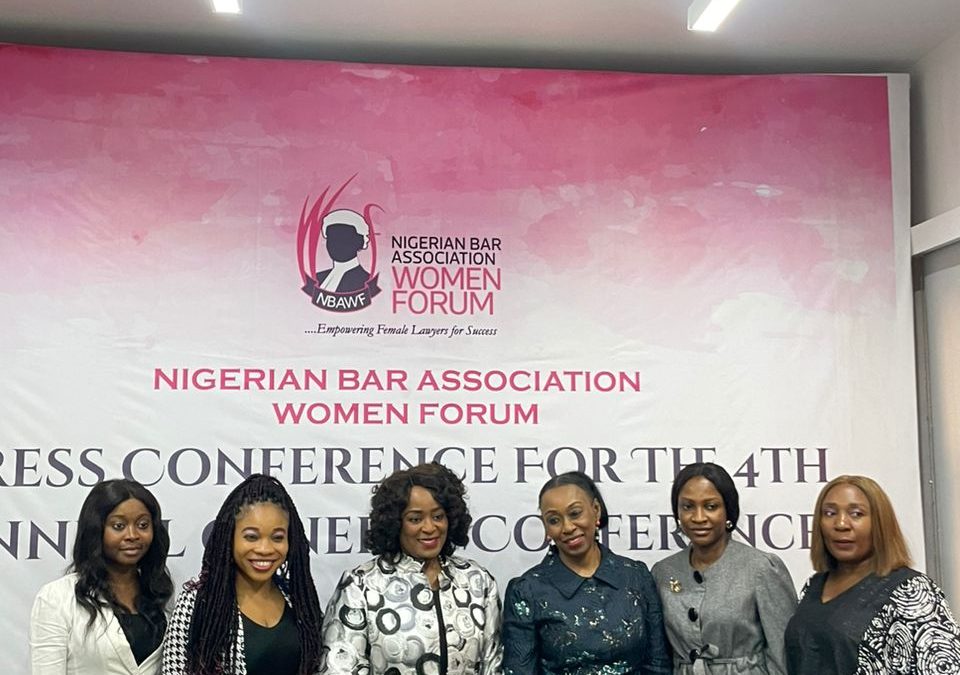
by Legalnaija | Mar 16, 2024 | Uncategorized
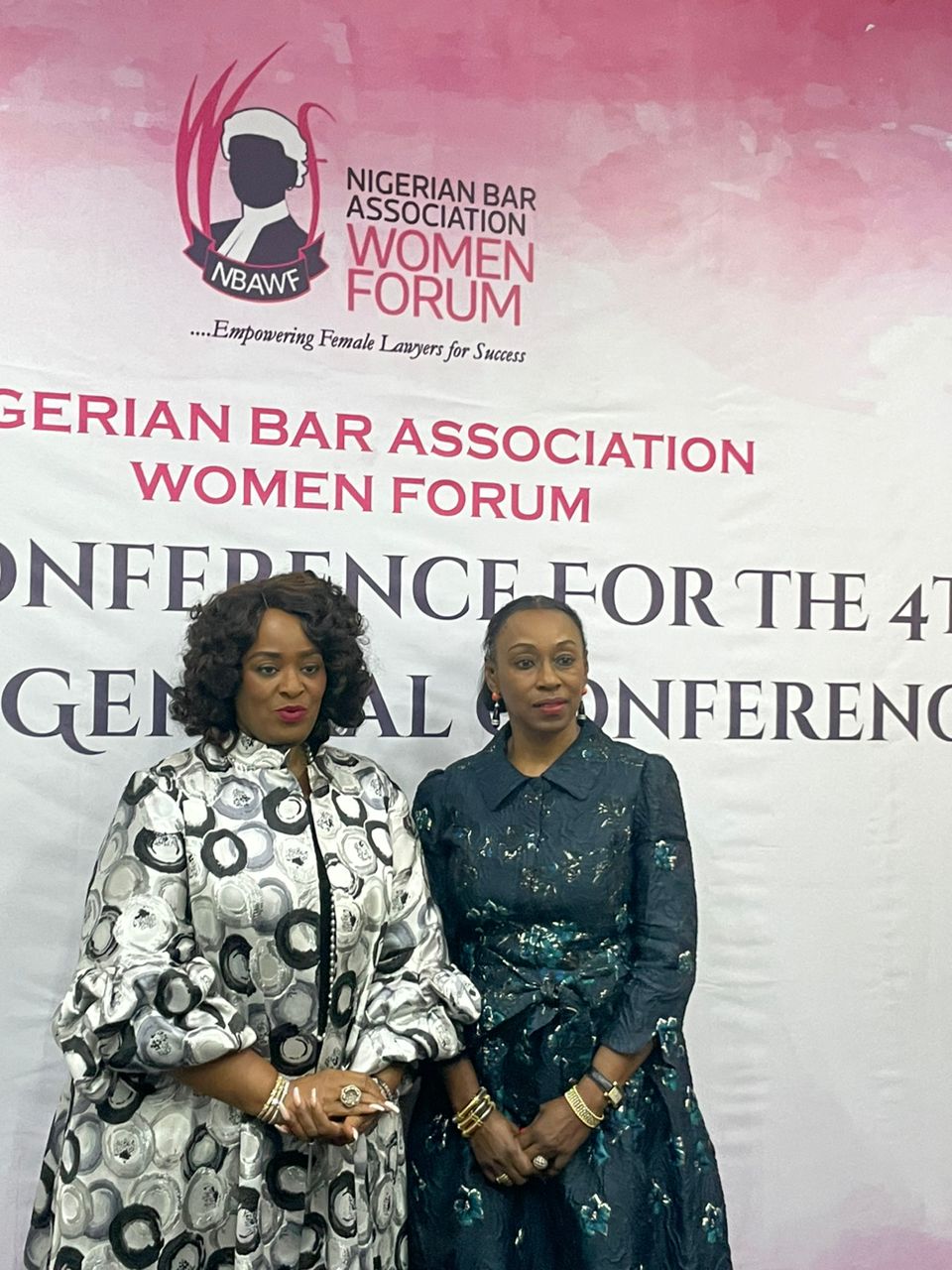
The NBA Women Forum held a press conference on the 15th of March, 2024 at Jackson, Etti and Edu, Victoria Island Lagos. The conference which commenced at about 10:55am was to share with world the amazing plans for its upcoming Event. It started with the introduction of members and Executives of the NBA Women Forum present which includes the Chairperson of the Nigerian Bar Association Women Forum, Mrs. Chinyere Okorocha, Mrs. Folashade Alli SAN, the chairperson of the planning committee of the 4th annual general conference, Mrs. Ifeoma and Mrs. Kemi Afesojaye in charge of the Logistics of the conference, Miss. Gloria Ireka, the Deputy Head of the publicity and Media Committee and Blessing Udoh a member of the committee. The Press men ably representing Legal Naija, STV, The nation amongst others present also introduced themselves after which a welcome address was given by the Chairperson of the Nigerian Bar Association Women Forum in person of Mrs. Chinyere Okorocha.
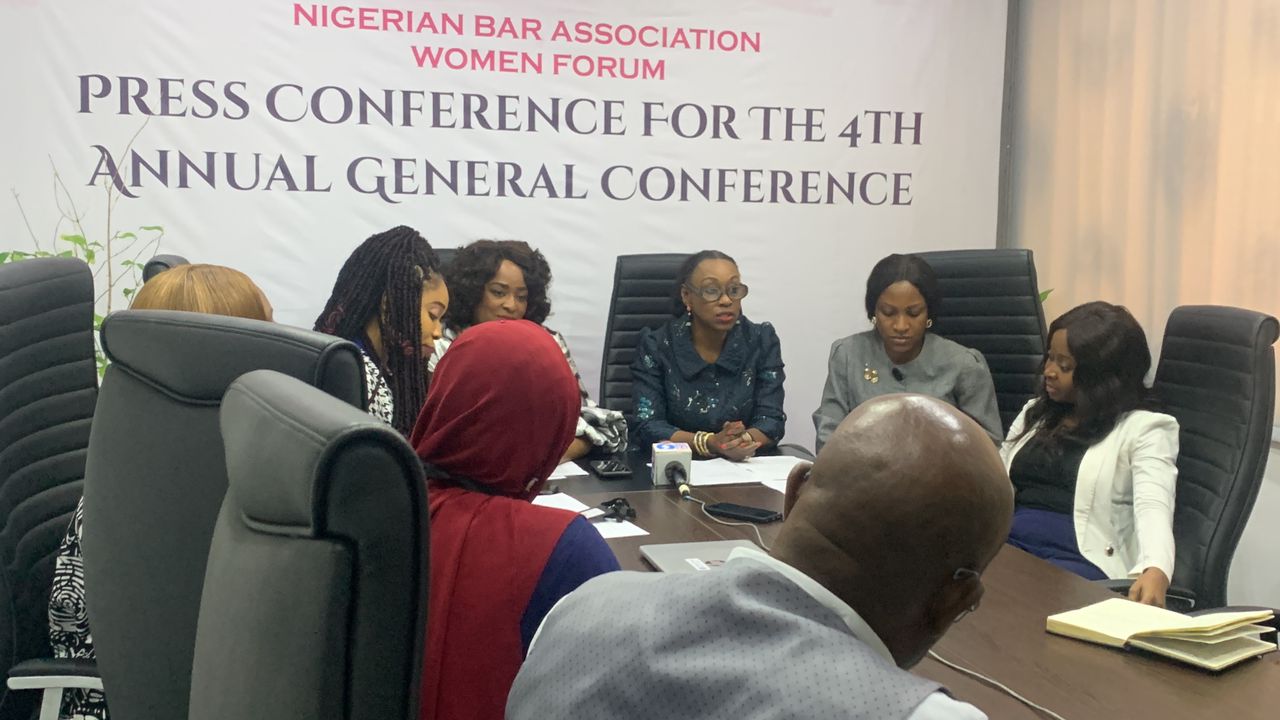
The chairperson officially opened the pre- event Press conference by giving an overview about the Nigerian Bar Association (NBA) women forum. She went down history and reminded us that the NBA Women Forum was first formed in 2007 but went moribund in 2014. The forum was re-inaugurated in 2019 under the leadership of Paul Usoro SAN. Since the forum was re-inaugurated in 2019, its core function has been to ensure that the needs of the Nigerian women Lawyers are catered for. The forum is an arm of the NBA has been able to exercise its duties through organizing seminars, training programmes, mentorship, workshops and collaboration with sister bodies internationally and locally. The forum seeks to address the predominant issues revolving around the career of female lawyers such as stereotypes and bias women face. The forum has a governing council and 11 committees to execute its duties to the women lawyers. The forum also has 125 NBAWF branch facilitators and state lead in all the 36 states including the FCT in a bid to reach the grassroots level and to be able to empower Nigeria female lawyers.
Chairperson stated that the month of March was specifically chosen for the conference because it is the month where different associations all around the world organize women programmes. She further stated that the theme of this year’s conference is “Beyond the Balance Sheet, Redefining Success for Women in Law”. This theme was carefully selected because success for a female lawyer may mean different thing, it goes beyond financial success. It could mean success in leadership and mentorship, thus the need to explore all the possible means a Nigerian female lawyer can experience success. The keynote speaker for the event is Mrs. Bolanle Austin Peters, who is the founder of BAP Productions and Terra culture and also a lawyer who has revolutionalise the creative industry in Nigeria and the global scene. Other dignitaries who would be gracing the conference include Funke Adekoya, SAN and Dr. Olusin who is the CEO of the Bank of Industry. The chairperson of the NBA Women Forum concluded her opening remarks by assuring all female lawyers a conference that has been carefully and effectively planned for ad urged all female lawyers to register for the conference which is scheduled to hold on the 21st and 22nd of March, 2024 at the Oriental Hotel Victoria Island, Lagos.
Mrs. Folashade Alli SAN, the Chairman of the Planning Committee reiterated the dates of the conference and further clarified the venues for the conference activities. In her address, she stated that the Pre- conference cocktail will hold at the Boat club on Awolowo road Ikoyi Lagos and will begin at 5pm on the 21st of March, 2024. She stated that the forum is expecting delegates across the states in Nigeria. According to her, the conference will be holding on the 22nd of March, 2024. The committee has put together 27 speakers and 5 moderators for the conference. There will be 6 plenary sessions alongside the keynote speech. She further spoke to the theme of the Conference and quoted the words of Mitchelle Obama who stated that success is not just the amount of money you have in your pocket but it is about the impacts you make in the life of others which is the goal of the NBA Women Forum.
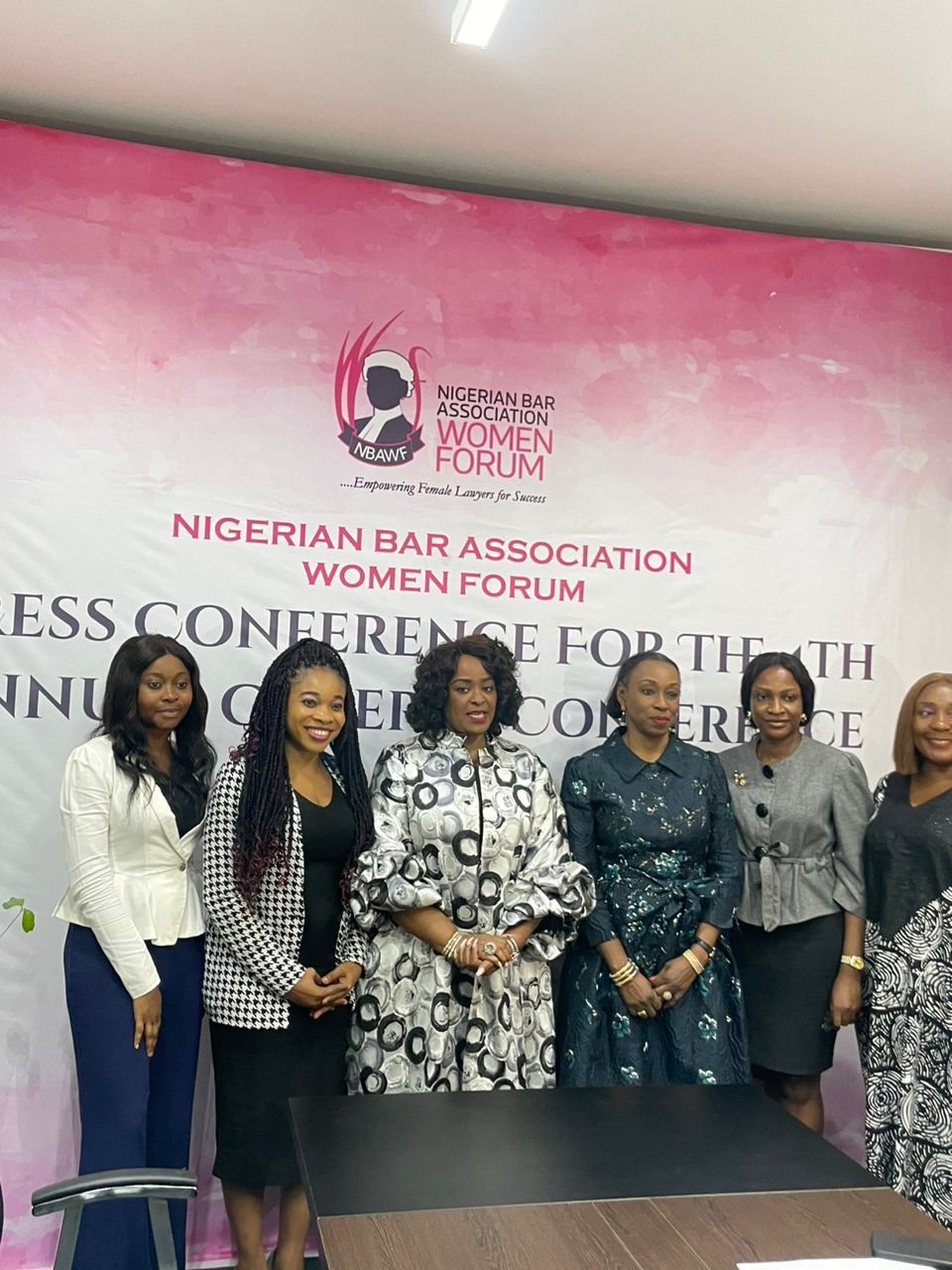
The committee chairman Mrs. Folashade Alli SAN also stated that the registration on the day of the conference starts by 8am. The first session of the Conference speaks about how dowe have a professional ecosystem for the female lawyer. Seasoned Lawyers like Learned Silk Mr Seni Adio, Mrs. Mobola Tejuosho a partner in AO2 law among others. The second session of the conference is centered on how to grow businesses and all you need to know about people management in growng a law firm, for this session the committee has selected seasoned lawyers like Mrs. George Etomi SAN, Mrs. Kofo Joseph, the chairman of Aluko and Oyebode, Oluwatosin Olaseinde and other speakers. This session seeks to enlighten and also assist those who Aare struggling with running their law firm.
The third session focuses on the role of technology in advancing gender equality and will be graced by speakers like Mr. Ope Olugasa of Law Pavilion, Rotimi Ogunyemi among others. The fourth session is about Elegance, Etiquettes and Panache, to address the issue of personal branding for female lawyers. Aisha Lemu, Funmi Roberts who are iconic females in the legal industry are the panelists to watch out for this session. The 5th session centres on health, work and everything around it in a bid to address the issue of work life balance. Speakers for this session include Beatrice Inyog from the United Nations Women, Fatima Muhammad, Uwa Oyiku and Dr. Yusuf Kadiri, A MENTAL health specialist. The last session will be addressing the definition of success for a female young lawyer, speakers for this session includes honourable Justice Ipaye, Professor Bamgbose SAN, Bidemi Ademola, Legal Director in Guinness and The committee chairman Mrs. Folashade Alli SAN. The chairman of the committee concluded by assuring the delegates that the conference promises to be engaging and entertaining and that w all look forward to having a great conference. She further stated that there would be side attractions like health checks, enough food, lots of dancing and a gala night to wrap up the conference.
Mrs. Kemi spoke about the logistics that has been put in place for the conference. She stated that the committee has partnered with hotels within the environs such as Oriental hotel Four point by Sheraton, Presken hotel among others close to the conference venue to provide accommodation for delegates outside and within Lagos at discounted rates. The committee has also made provision for shuttles to move delegates and speakers from the airport to the venue. She also reiterated that alongside educative sessions there would be entertainment session too.
Mrs. Ifeoma rounded up by addressing registration for the conference. The registration is in two categories, the young lawyers’ category who will be paying a sum of 10,000 naira and senior lawyers who are to pay 20,000 naira. The registration is to be concluded a day before the commencement of the conference in order to ensure all the planning are put in place and ensure a wonderful conference. She said the turnout for registration has been good but they want more people to register. Payments can be made via www.nbawomenforum.org.ng. She concluded by thanking all the sponsors that have donated to ensure a successful conference while also appealing that more sponsors will be appreciated in a bid to give a world class conference.
The chairperson of the women forum also commended the support of the NBA chairman and stated that the chairman will be there to give an opening speech. Pressmen were then allowed to ask questions regarding the conference and the women reform. Mr. Austin, Editor of Newayalogue asked the committee members what has been put in place and progress that has been made regarding leveraging technology to advance the career of female lawyers as that was the theme for the last conference which held at Abuja last year. The chairperson addressed this that the forum has been able to leverage on virtual platforms to organize seminars and events. The forum has also employed the virtual meeting option. The forum has also been able to reach out and collaborate with international organizations virtually. She further stated that the committee has plans in place to send female lawyers abroad for trainings. He also directed a question to the chairperson about what young lawyers stand to gain in the conference. The chairperson addressed this question by stating that there is a discount for young lawyers, provision for law students from universities in Lagos and the Nigerian Law School in a bid to ensuring the students are not left out in the discussions.
The representative of Legal Naija asked the committee about what is been done to reach as many female lawyers as possible especially newly called lawyers. The Chairperson responded by stating that the forum liaises with NBA to send out mailing list to lawyers, the forum has young lawyers in its committees in a bid to reach more people and the forum has taken it upon itself to go to the Nigerian law school during call to bar to collate information of female newly called lawyers.
The press conference was formally closed by a closing remark made by Blessing Udoh.

by Legalnaija | Feb 26, 2024 | Uncategorized
Introduction
As an entrepreneur or business owner, navigating the legal landscape can be daunting. From contracts and agreements to understanding your rights and obligations, having access to reliable legal resources is crucial. Enter Legalnaija, your one-stop-shop for all things legal in Nigeria. Let’s explore how entrepreneurs can tap into this platform and reap its benefits.
1. Finding Legal Representation
Legalnaija offers a powerful tool to connect entrepreneurs with experienced lawyers. Whether you need assistance with business registration, intellectual property, or contract drafting, you can find a lawyer specializing in your specific area of expertise. Having legal counsel ensures that your business operates within the bounds of the law, mitigating risks and fostering growth.
2. Legal Education and Empowerment
Knowledge is power, especially in the legal realm. Legalnaija hosts a treasure trove of over a thousand articles that educate the public and readers on their legal rights and obligations under Nigerian laws. As an entrepreneur, staying informed about legal developments empowers you to make informed decisions. Explore topics like tax compliance, employment laws, and business https://app.legalnaija.com/shop/templates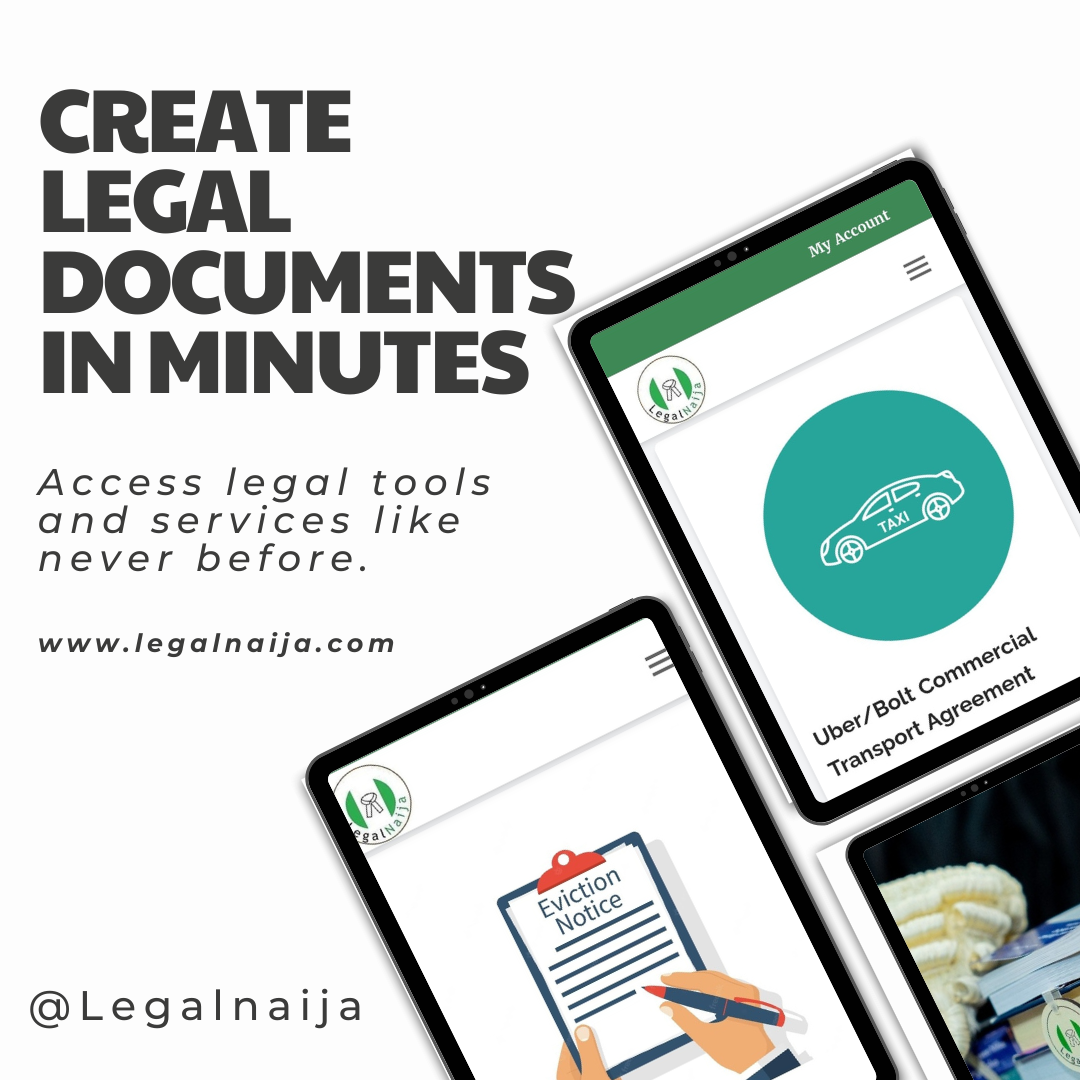
3. Drafting Agreements with Ease
Entrepreneurs often require well-crafted contracts and agreements. Legalnaija simplifies this process by allowing you to draft and download legally sound agreements. Whether it’s a partnership agreement, employment contract, or vendor agreement, the platform provides customizable templates. Save time and resources by creating professional documents tailored to your business needs.
4. Access to Law Books and Publications
Staying updated on legal principles and precedents is essential. Legalnaija offers a curated selection of law books and publications. From textbooks to practical guides, entrepreneurs can enhance their legal knowledge. Whether you’re diving into energy and petroleum industry law or studying fundamental rights enforcement, these resources empower you to make informed decisions.
5. Online Dispute Resolution (ODR)
Disputes are inevitable, but resolving them efficiently matters. Legalnaija provides an ODR platform, allowing entrepreneurs to resolve disputes online. Whether it’s a contractual disagreement or a business-related conflict, explore alternative dispute resolution methods. Timely resolution preserves business relationships and minimizes disruptions.
Conclusion
Entrepreneurs play a vital role in shaping society. By leveraging Legalnaija’s tools, you not only protect your business but also contribute to a legally aware and empowered community. Stay informed, draft robust agreements, and seek legal guidance—it’s the path to sustainable success.
Visit Legalnaija today and unlock the legal tools that propel your entrepreneurial journey! 🚀🔍📜
Disclaimer: This post provides general information and does not constitute legal advice. Always consult a qualified attorney for specific legal matters.
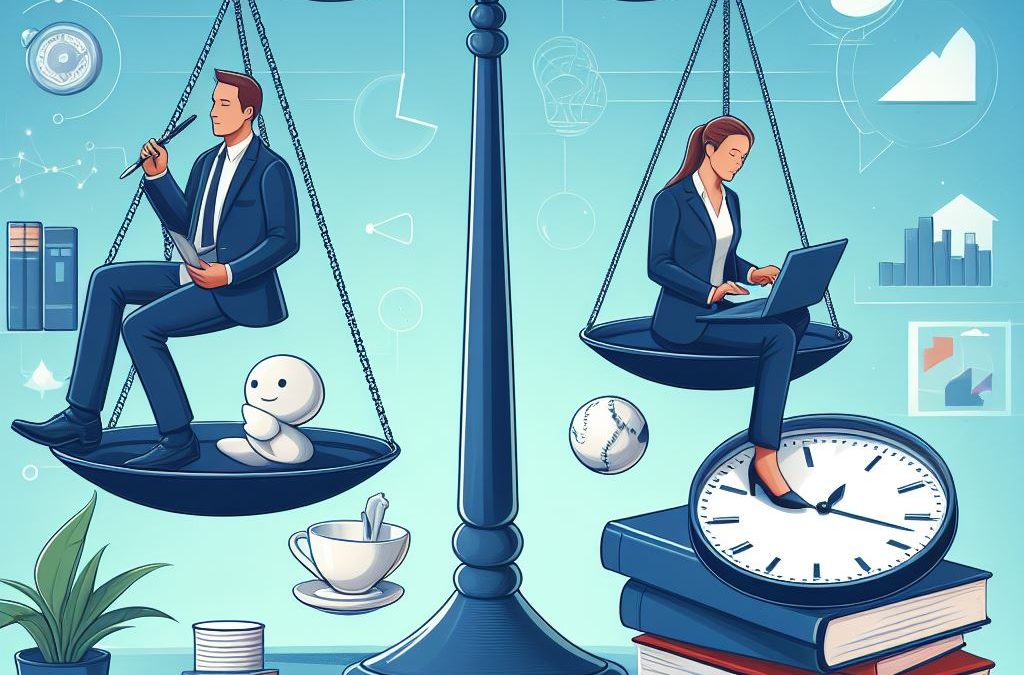
by Legalnaija | Feb 20, 2024 | Uncategorized
How to balance your personal and professional life as a lawyer
Being a lawyer can be rewarding, but also demanding and stressful. You may have to deal with long hours, tight deadlines, complex cases, and high expectations from your clients, colleagues, and yourself. You may also have to balance your work with your personal life, which may include your family, friends, hobbies, and health.
How can you achieve a healthy work-life balance as a lawyer? How can you manage your time, energy, and priorities effectively? How can you cope with the challenges and pressures of your profession, while also enjoying life beyond work?
In this post, I want to share some tips and resources that have helped me balance my personal and professional life as a lawyer. I also want to connect and empathize with you on a personal level, and to hear your thoughts and experiences on this topic.
Tip #1: Set boundaries and communicate them clearly
One of the first steps to achieving a healthy work-life balance is to set boundaries between your work and personal life. This means defining what is acceptable and unacceptable for you in terms of your workload, schedule, availability, and expectations. For example, you may decide to limit your work hours to a certain number per day or week, to avoid checking your emails or phone after a certain time, or to decline taking on extra tasks or projects that are not aligned with your goals or values.
Once you have set your boundaries, you need to communicate them clearly to your clients, colleagues, supervisors, and anyone else who may be affected by them. You need to explain why these boundaries are important for you, and how they will benefit your work performance and quality. You also need to be consistent and firm in enforcing your boundaries, and to avoid making exceptions or compromises that may undermine them.
Setting and communicating boundaries can help you reduce stress, avoid burnout, and improve your focus and productivity. It can also help you respect and protect your personal time, space, and needs, and to enjoy your life outside work.
Tip #2: Prioritize and plan your tasks and activities
Another step to achieving a healthy work-life balance is to prioritize and plan your tasks and activities. This means identifying what is important and urgent for you, and what is not. You can use tools such as the Eisenhower matrix, the Pareto principle, or the SMART criteria to help you sort and rank your tasks and activities according to their importance and urgency.
Once you have prioritized your tasks and activities, you need to plan how and when you will accomplish them. You can use tools such as a calendar, a to-do list, or a project management software to help you organize and schedule your tasks and activities. You can also use tools such as a timer, a pomodoro technique, or a batch processing method to help you manage and optimize your time and energy.
Prioritizing and planning your tasks and activities can help you increase your efficiency, effectiveness, and satisfaction. It can also help you avoid procrastination, distraction, and overwhelm, and to achieve your goals and deadlines.
Tip #3: Delegate and outsource some of your work
Another step to achieving a healthy work-life balance is to delegate and outsource some of your work. This means assigning or transferring some of your tasks or responsibilities to someone else who can do them better, faster, or cheaper than you. For example, you may delegate or outsource some of your administrative, technical, or legal work to your staff, colleagues, or external services.
Delegating and outsourcing some of your work can help you free up some of your time and energy, and to focus on the core and strategic aspects of your work. It can also help you leverage the skills, expertise, and resources of others, and to improve the quality and outcome of your work.
However, delegating and outsourcing some of your work also requires some skills and strategies. You need to choose the right tasks and people to delegate or outsource to, and to provide clear instructions, expectations, and feedback. You also need to trust and empower the people you delegate or outsource to, and to monitor and evaluate their performance and results.
Tip #4: Take care of yourself and your well-being
Another step to achieving a healthy work-life balance is to take care of yourself and your well-being. This means paying attention to your physical, mental, emotional, and spiritual health, and to do things that nourish and support them. For example, you may take care of yourself and your well-being by eating well, sleeping well, exercising regularly, meditating, relaxing, having fun, learning new things, expressing your feelings, connecting with others, and pursuing your passions.
Taking care of yourself and your well-being can help you maintain and enhance your energy, motivation, and passion. It can also help you cope with the stress, challenges, and pressures of your work, and to prevent or recover from burnout, depression, or anxiety.
However, taking care of yourself and your well-being also requires some commitment and discipline. You need to make time and space for yourself and your well-being, and to treat them as a priority and a necessity. You also need to be aware of your needs and limits, and to seek help or support when you need it.
Conclusion
Balancing your personal and professional life as a lawyer can be challenging, but also rewarding and fulfilling. You can achieve a healthy work-life balance by setting boundaries, prioritizing and planning your tasks and activities, delegating and outsourcing some of your work, and taking care of yourself and your well-being. These tips and resources can help you manage your time, energy, and priorities effectively, and to enjoy your life beyond work.
I hope you found this post helpful and interesting. I would love to hear your thoughts and experiences on how you balance your personal and professional life as a lawyer. Please feel free to share your comments, questions, or feedback below. Thank you for reading! 😊
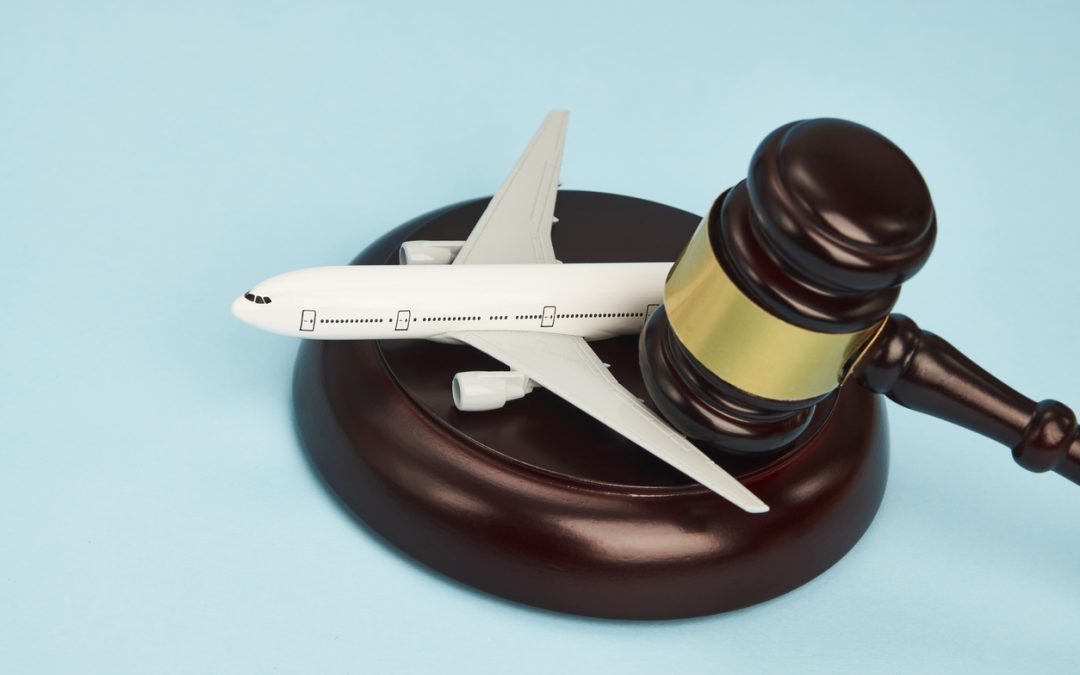
by Legalnaija | Feb 19, 2024 | Uncategorized
This discussion will not be well explained if the concept of aeroplane accidents is not explained. An aeroplane accident can be said to be that which can occur on a flight leading to injury on passengers between the times of embarking and disembarking a plane. These injuries can come in various forms either minor or major injury depending on the nature of the accident.
Perhaps you have been involved in or know someone who has been involved in an aeroplane accident, you might be eligible to make an aeroplane accident compensation claim against the airline company you flew with either local or international flight.
Aeroplane accidents happen every day onboard aircrafts, aircraft can be classified into various categories. either jet, Helicopter, amphibious airplane or fighters. Most of the time, these accidents are through no fault of their own. Aeroplane accidents differ from minor injuries to severe injuries, depending on the nature of the accident as stated earlier.
The reason why all of this happens is that aircraft travel is generally the safest means of transportation; however, aeroplane accidents on board a flight are still common. Aeroplanes are usually a scary place, especially for people who are afraid of flying. It may interest you to know that most times some aircraft operators themselves are usually afraid of flight too. Haven stated this, let’s delve into the legal aspect of aeroplane claims in Nigeria. Globally speaking and considering international coverage that aviation provides, Nigeria is a party to the Convention for the Unification of Certain Rules for International Carriage by Air (Montreal Convention) 1999, a major international law air treaty governing an air carrier’s liability for damages caused to its passengers during an aeroplane accident, including death. The Montreal Convention of 1999 has replaced the Warsaw Convention, 1929 and has been ratified by the Nigerian Legislature in line with Section 12, 1999 Constitution of the Federal Republic of Nigeria, it has been currently incorporated into Nigerian Law, as captured in Section 48(1) of the Civil Aviation Act, 2006.
Consequently, the case of Harka Air Services (Nigeria) Ltd v Keazor stated that liabilities of an air carrier to its passengers could arise from Injury sustained while onboard or Death of a passenger during the course of a journey, Loss, damage of goods/baggage, Delay or cancellation of flights.
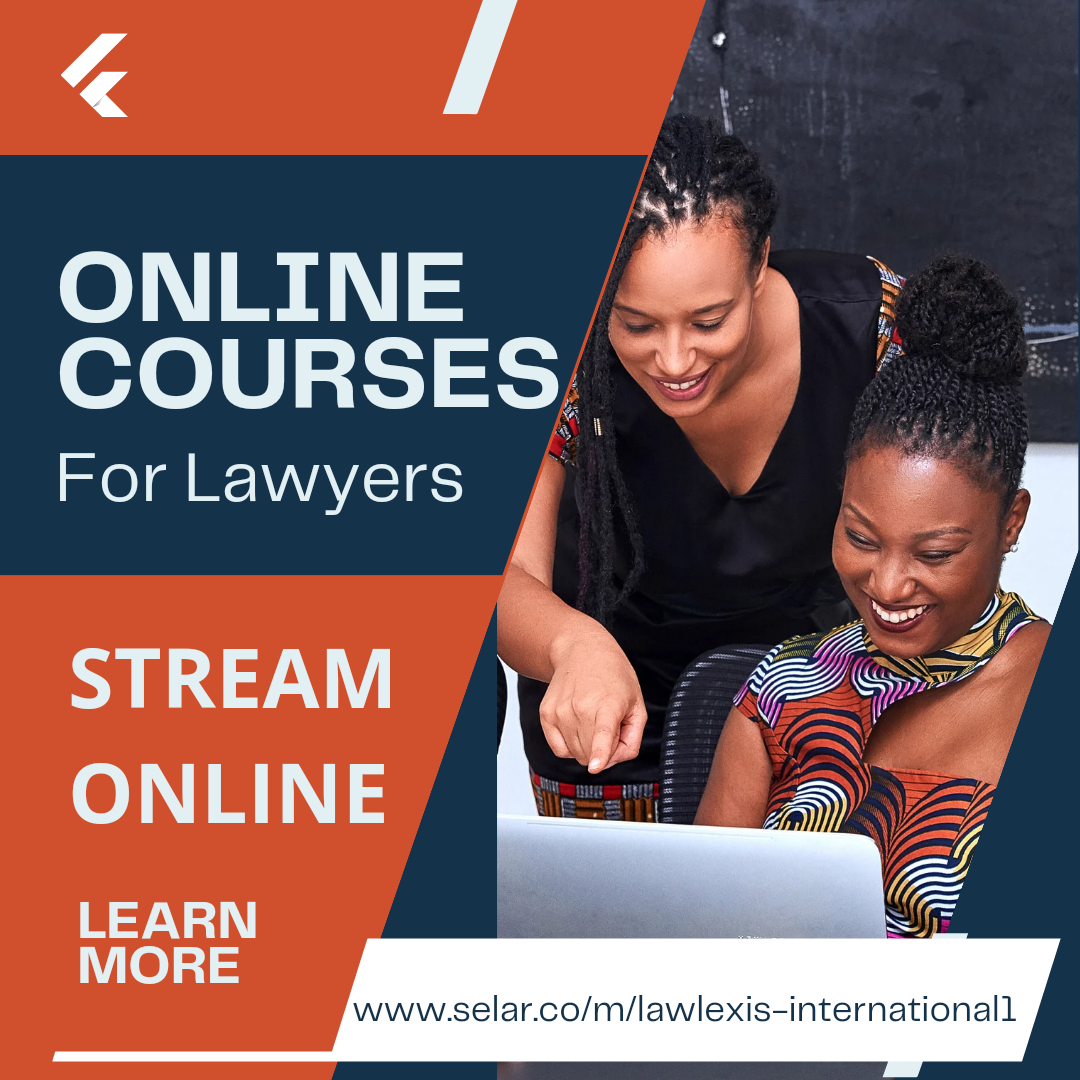
Furthermore, the Consumer Protection Regulations which are contained in Part 19 of Nigeria Civil Aviation Regulations 2015 form the bedrock of liability of air carriers. Both regulations are sacrosanct as they fill in gaps left in the Montreal Convention and the Civil Aviation Act. This has paved a way for victims of air disasters to make claims under the law of torts because most air disasters give rise to tortious liability.
The claims for damages in aeroplane accidents can either be special or general. Note that For a claim of general damages to succeed, the claimant need not specifically prove fact. However, special damages must be particularly pleaded. The purpose of general damages is to compensate for damages suffered from wrongful acts, done deliberately. Where the act done is deliberate, it is said to be implied hence it need not be specifically proved.
An example of a deliberate act that resulted in damages is the Germanwings Flight 9525 which was a scheduled international passenger flight from Barcelona–El Prat Airport in Spain to Düsseldorf Airport in Germany. The flight was operated by Germanwings, a low-cost carrier owned by the German airline Lufthansa. On 24 March 2015, the aircraft, an Airbus A320-211, crashed 100 km (62 mi; 54 nmi) north-west of Nice in the French Alps. All 144 passengers and six crew members were killed. The crash was deliberately caused by the co-pilot, Andreas Lubitz, who had previously been treated for suicidal tendencies and declared unfit to work by his doctor. Lubitz kept this information from his employer and instead reported for duty. Shortly after reaching cruise altitude and while the captain was out of the cockpit, Lubitz locked the cockpit door and initiated a controlled descent that continued until the aircraft hit a mountainside.
By 2017, Lufthansa had paid €75,000 to the family of every victim, as well as €10,000 in pain and suffering compensation to every close relative of a victim.
In conclusion, there is a general maxim of law which posits that Ubi jus ibi remedium. Ubi jus ibi remedium is a Latin legal maxim that translates to “where there is a right, there is a remedy.” It encapsulates the principle that when a legal right is violated, the law provides a corresponding remedy or relief to the aggrieved party.
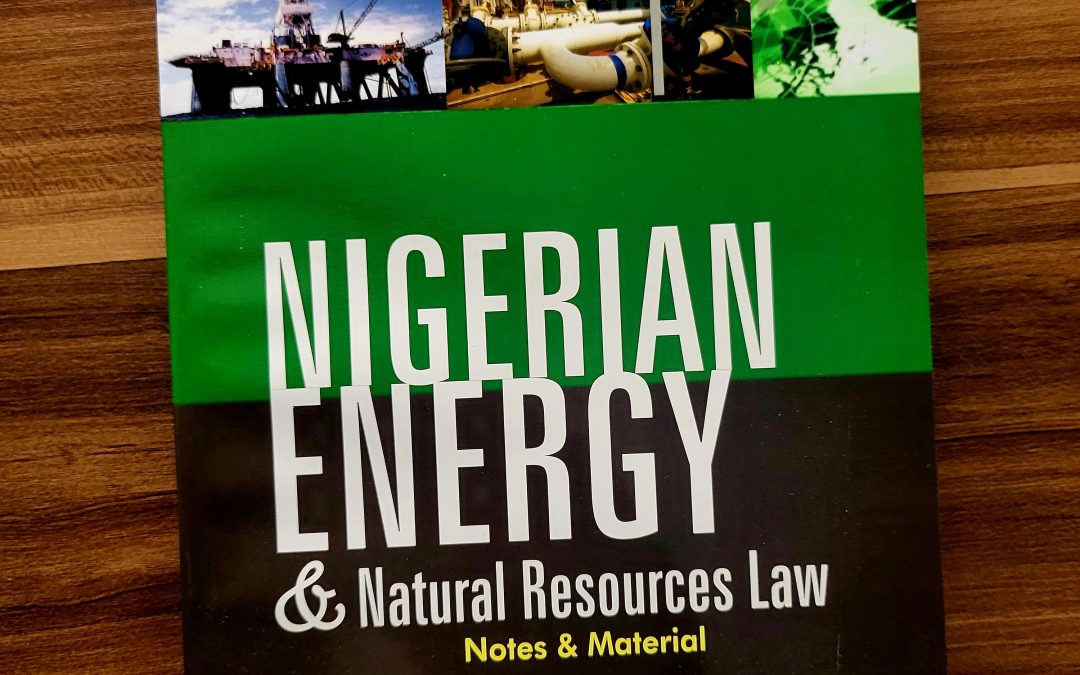
by Legalnaija | Feb 14, 2024 | Uncategorized
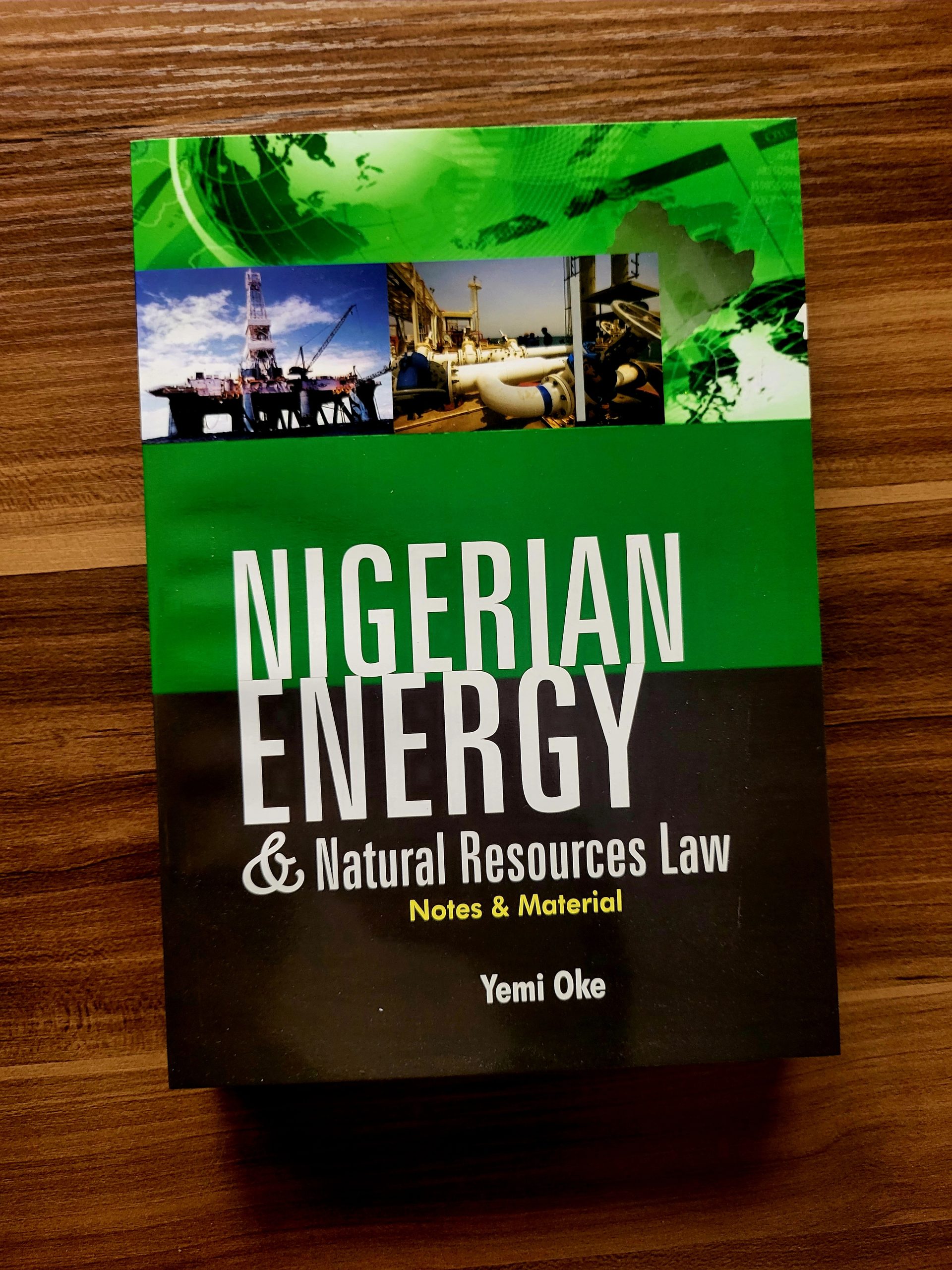
6 Books For Oil and Gas Lawyer
Oil and gas law is a complex and dynamic field that requires specialized knowledge and skills. If you are an oil and gas lawyer or aspiring to be one, you might want to check out these four books that cover various aspects of the Nigerian energy and petroleum industry. These books are written by experts and practitioners who have extensive experience and insight into the legal, regulatory, and commercial issues that affect the oil and gas sector in Nigeria. All six books are available on Legalnaija, a leading online platform for legal resources and services in Nigeria.
1. Nigerian Energy And Petroleum Industry Law https://legalnaija.com/product/nigerian-energy-and-petroleum-industry-law/ #legalnaija via @legalnaija
2. Nigerian Petroleum, Energy and Gas Resources Law https://legalnaija.com/product/nigerian-petroleum-energy-and-gas-resources-law/ #legalnaija via @legalnaija
3. Understanding Petroleum (Oil & Gas) Transactions and the Nigerian Market https://legalnaija.com/product/understanding-petroleum-oil-gas-transactions-and-the-nigerian-market/ #legalnaija via @legalnaija
4. Oil and Gas Laws In Nigeria https://legalnaija.com/product/oil-gas-laws-in-nigeria/ #legalnaija via @legalnaija
5.Nigerian Energy And Natural Resources Law https://legalnaija.com/product/nigerian-energy-and-natural-resources-law/ #legalnaija via @legalnaija
6. Nigerian Energy Resources Law And Practice https://legalnaija.com/product/nigerian-energy-resources-law-and-practice/ #legalnaija via @legalnaija
Order all the books via the links above or send a mail to hello@legalnaija.com or whatsapp 09029755663.
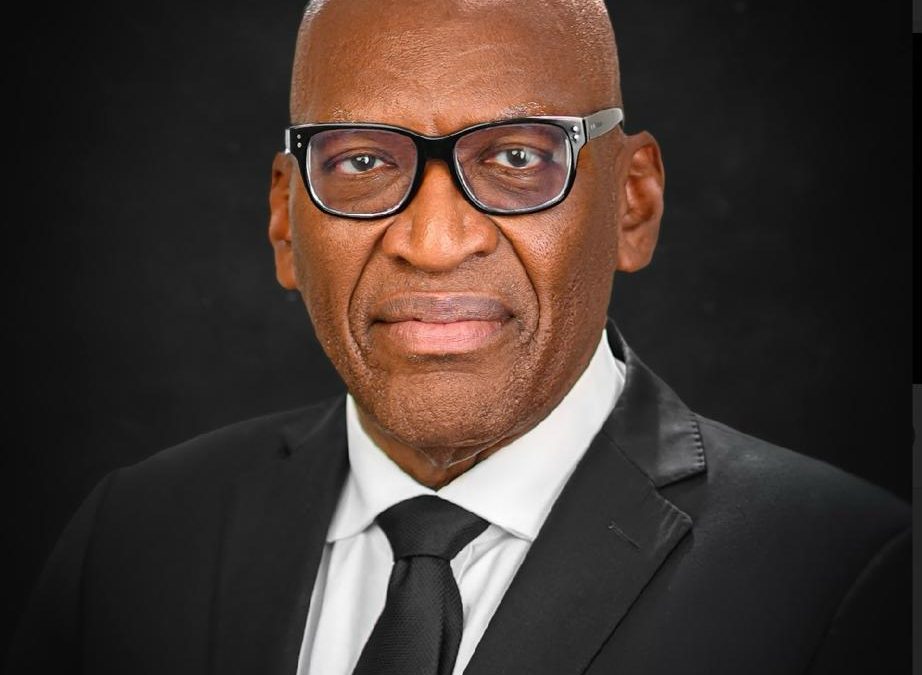
by Legalnaija | Feb 11, 2024 | Uncategorized
The Latterhouse Publishers Ltd. announces the official launch of “Lawyer-Client Relation,” a publication by Oluwemimo Ogunde SAN
On February 15th 2024, the legal community will witness the formal launch of the highly anticipated book, “Lawyer-Client Relation: Beating swords into ploughshares, authored by Oluwemimo Ogunde SAN
This comprehensive guide delves into the intricate dynamics of lawyer-client relationship, offering invaluable insights for legal practitioners and enthusiasts alike.
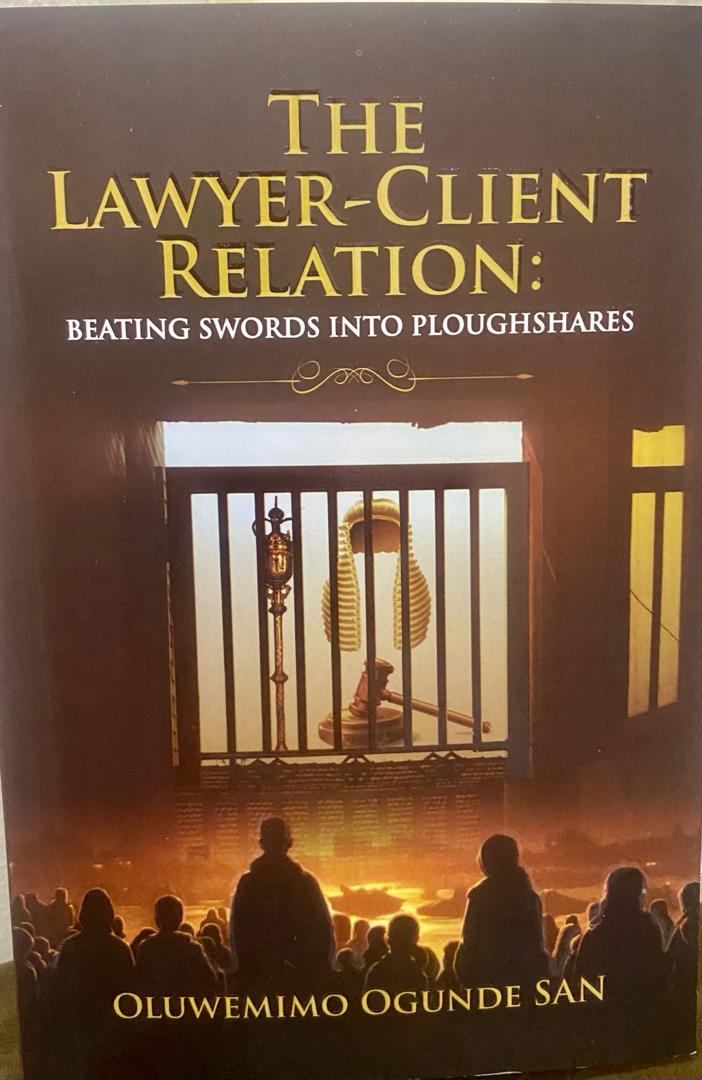
The occasion will be chaired by distinguished lawyer and banker ,Mr Yemi Adeola, Chairman, Sterling Financial Holdings Company Plc.
Special guest-of-honour: Dr Festus Alani Fadeyi, Chairman Pan Ocean Group.
Special guest- of-honour: Mr Adamu Atta. Chairman, M. I.A holdings
Renowned legal scholar Pro Deji Adekunle, SAN, formerly Director-General, Institute of Advanced Legal Studies, will grace the event as the esteemed Book Reviewer. His expertise and critical analysis are set to shed light on the significance of this work in the legal field.
The public lecture will be delivered by the distinguished legal luminary Mr. Tayo Oyetibo SAN whose profound experience and wisdom promise to enrich the discourse surrounding the book’s themes.
This event is anticipated to draw various legal luminaries, scholars, practitioners, and enthusiasts, creating a platform for engaging discussions, networking opportunities, and the celebration of legal scholarship at its finest.
Join us on February 15th as we embark on a journey through the intricacies of lawyer-client relationships and explore the profound impact of this essential publication on the legal landscape.























